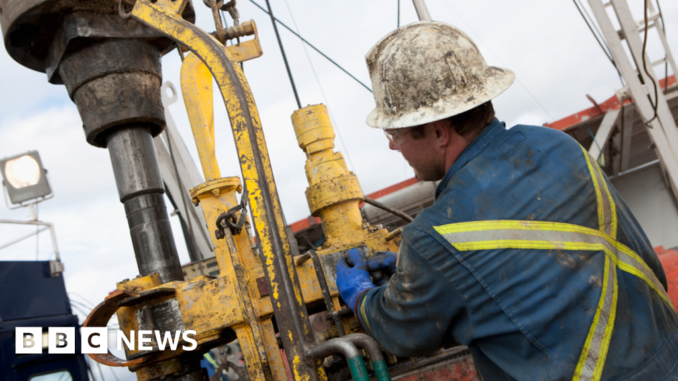
As the conflict across the Middle East widens, rising oil prices are being closely watched.
The cost of oil affects everything from the price of food at the supermarket to how much it costs to fill up your car.
The price of crude oil has risen almost 10% this week to around $78 a barrel as the conflict has intensified.
That may seem like a big jump, but the price of crude oil tends to be volatile, and in the aftermath of Russia’s invasion of Ukraine, a barrel of benchmark Brent crude hit almost $130.
The uptick comes as many countries, including the UK, are just beginning to recover from the sharp rise in oil prices after the Covid pandemic and Russia’s war in Ukraine. So how worried should we be?
Crude oil is a key ingredient in petrol and diesel, meaning higher oil prices could drive up prices at the pumps just when they’ve just hit their lowest level for three years.
If a company delivering goods, such as food, is hit by higher fuel costs, it is also likely to raise its prices. These increased costs could then be passed on by supermarkets selling the food to us, the consumer. The cost of living goes up.
“Everything we go and buy in the shop has been transported around and has been made from things that have been transported around. The increase in fuel costs tends to filter into everything,” Callum Macpherson, head of commodities at Investec, tells the BBC.
Andrew Bailey, governor of the Bank of England, which sets interest rates, has warned the conflict in the Middle East has the potential to have a “very serious” impact on the UK.
Mr Bailey said he was watching developments “extremely closely”. This comes as he signalled interest rates are on the path downwards, and the UK’s prospects on inflation – which has come down after being driven up by high oil and gas prices in 2022 – are looking brighter.
Yet so far a rise to about $78 a barrel is not the time for alarm bells.
If the “worst-case scenario” of further escalation does not materialise, oil prices are likely to “ease back quite quickly”, says Caroline Bain, chief commodities economist at Capital Economics.
Iran is the world’s seventh largest oil exporter, with half of its exports going to China. If supplies were disrupted, China could turn to Russia.
But Ms Bain warns markets are “finely balanced”, and if the conflict escalates, “taking out a medium-sized supplier like Iran would lead to a spike in prices”.
She says there is “more than enough capacity” globally to cover the gap if Iranian production is lost, but there is the question of where Saudi Arabia’s “loyalty will lie” as the world’s second largest oil producer and whether it will increase or restrict further production.
Mr Macpherson says if Israel did decide to attack Iran’s oil sector, a rise in the price of Brent crude could increase the cost of filling up at the pumps “quite quickly”.
He explains that this scenario could threaten general inflation in the UK, which could in turn influence any decision from the Bank of England to lower interest rates.
However, he also points out “there might not ultimately be any disruption to supply” at all.
The direct impact of Iran’s oil production is not the only concern.
There is a risk that any escalation in the region could block the Strait of Hormuz, a relatively narrow channel through which a huge amount of oil tanker traffic passes -about a third of total seaborne-traded oil.
It is also the path through which a fifth of liquefied natural gas (LNG) is transported, a commodity that the world has become more dependent on since sanctions were imposed on Russia following its invasion of Ukraine.
Asia is most physically dependent on the flow of oil and gas out of the Persian Gulf, and the immediate impact of an escalation would be significant.
Disruption to LNG shipments from one of the world’s biggest exporters in Qatar would lead to higher gas prices – which could in turn lead to a rise in household gas and electricity bills. As with oil, gas prices filter down supply chains, affecting the cost of virtually all goods.
UK energy bills have risen 10% for this winter, but are currently predicted to fall slightly in January. This forecast could change of course, if an escalation to the conflict in the Middle East affects global gas supplies, and leads to higher prices.
But Ms Bain says the risk of strait being blocked as a result of the conflict is small.
And if it does transpire, Mr Macpherson adds the effect on the UK would be minimal, given that most of Europe’s gas is supplied mainly from Norway.
There are a lot of possible outcomes, but in terms of what will happen with oil prices in the coming weeks and months, “nobody knows”, Mr Macpherson admits.
There’s a “wide spectrum” of what could come next, he adds, but “there is really no way of telling where we will be this time next week”.


Be the first to comment